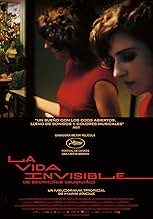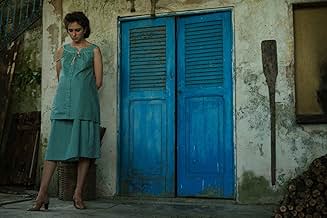IMDb RATING
7.7/10
10K
YOUR RATING
In 1950s Rio de Janeiro, two sisters live restricted lives with their conservative parents. After they are separated and forced to live apart, they try to take control of their destinies and... Read allIn 1950s Rio de Janeiro, two sisters live restricted lives with their conservative parents. After they are separated and forced to live apart, they try to take control of their destinies and hold on to the hope of finding one another.In 1950s Rio de Janeiro, two sisters live restricted lives with their conservative parents. After they are separated and forced to live apart, they try to take control of their destinies and hold on to the hope of finding one another.
- Awards
- 38 wins & 53 nominations total
Gregório Duvivier
- Antenor
- (as Gregorio Duvivier)
Featured reviews
The Invisible Life of Euridice Gusmao is a melodrama that gives the audience a look at Brazilian culture during the 1950s and what life was like for most women under the patriarchal society that often made them struggle to succeed. What captured my attention from the outset were the spectacular set design and the period costumes that accurately depict life from that time. The production team, particularly director Karim Aïnouz and producer Rodrigo Teixeira, have my ultimate respect in nailing those aspects so accurately. This film entertained and educated me about that period of time and its culture, which are very unique characteristics I don't often see, but love.
The film is about two inseparable sisters living in Rio de Janeiro during the 1950s, that live under their conservative parents' strict guidance. Even though both sisters are involved in the traditional life that surrounds them, Euridice wants to become a renowned pianist and Guida wants to find true love. When their father separates them and makes them live apart from each other, they work to meet their goals, while hoping that they can reunite one day and celebrate life together, since they are each other's support and joy.
My favorite scene is when Euridice carefully covers for Guida's secret nighttime outings to dance clubs with a Greek sailor. She encourages her sister to not give in to their parents' strict lifestyle and proposes that they should expose themselves to experiences that will fill them with happiness.
The important message that I learned from this film is the importance of how women have fought for their place and equality within a patriarchal society. Before, women were submissive to the patriarch, but as time has passed, society has realized what a huge injustice was being made and corrected the social forms. This movie is very big on showing how times were different back then for women and how thankful we all must be that a turn was made. Young women like Euridice and Guida struggled from an early age to find happiness. I rate this movie 5 out of 5 stars and recommend it for ages 13 to 18, plus adults.
Reviewed by Alejandra G. , KIDS FIRST! Reviewers. For more film reviews by tweens and teens, visit kidsfirst dot org.
The film is about two inseparable sisters living in Rio de Janeiro during the 1950s, that live under their conservative parents' strict guidance. Even though both sisters are involved in the traditional life that surrounds them, Euridice wants to become a renowned pianist and Guida wants to find true love. When their father separates them and makes them live apart from each other, they work to meet their goals, while hoping that they can reunite one day and celebrate life together, since they are each other's support and joy.
My favorite scene is when Euridice carefully covers for Guida's secret nighttime outings to dance clubs with a Greek sailor. She encourages her sister to not give in to their parents' strict lifestyle and proposes that they should expose themselves to experiences that will fill them with happiness.
The important message that I learned from this film is the importance of how women have fought for their place and equality within a patriarchal society. Before, women were submissive to the patriarch, but as time has passed, society has realized what a huge injustice was being made and corrected the social forms. This movie is very big on showing how times were different back then for women and how thankful we all must be that a turn was made. Young women like Euridice and Guida struggled from an early age to find happiness. I rate this movie 5 out of 5 stars and recommend it for ages 13 to 18, plus adults.
Reviewed by Alejandra G. , KIDS FIRST! Reviewers. For more film reviews by tweens and teens, visit kidsfirst dot org.
If you're interested in a deep view of Brazilian life and culture, look no further than this wonderful film. The characters are real, they love and fight intensely, the way Brazilians do. This was a wonderful time capsule of Brazil in the 1950's.
I cannot understand the low-ratings from people who won't watch because they won't read subtitles! You've cheated yourself out of an amazing experience.
I cannot understand the low-ratings from people who won't watch because they won't read subtitles! You've cheated yourself out of an amazing experience.
My biggest turndown with Invisible Life's biggest competition inside Brazil this year ('Bacurau') was the excess of metaphors to make it a smart work -- some of which have absolutely no contibution to the story. Still, it was able to provoke a lot of emotional reactions, it's specially smart and meaningful to watch from a Brazilian perspective. Invisible Life is something different, it's universal, delicate and rough at the same time, and it's story has no need to explaining -- we all know what it is about. Still, they explain (the only reason why it's not a 100% for me).
Carol Duarte and Julia Stockler are incredible. Also need to mention the short appearance from Brazil's greatest actress of all time, Academy Award nominee Fernanda Montenegro, not only for the name but mostly because, after 120 minutes of the movie, her performance was still able to reach out to the emotions you built for the characters in the past 2 hours.
Overall, absolutely beautiful. The film is a visual spectacle, but also a beautiful and touching story.
How much did our mothers and grandmothers suffer from the patriarchy? How much did they have to hide, supress and ignore to protect us from past abuses?
Karim Ainouz tells, in his emotional tropical melodrama, stories from a time when a woman was expected to be subordinate in every single aspect of her life. Guida and Eurídice, apart from each other, lived outrageous trajectories, and, unfortunately, with expressive scars that lasted until today. The lies of extremally conservative parents, the superb and envy of Eurídice's husband, the suffering in maternity, the crucial solidarity between desperate women - all of it built a strong indignation and, at last, everybody cries in the end: a real tragic one. Fernanda Montenegro is an acting gem.
With technical maestry, Karim's team guides the movie in a raw way. The cinematography of Hélène Louvart is outstanding capturing old, green and dirty Rio de Janeiro. Karim's directing choices are really touching and carry a whole bunch of social issues with flow. The cello and piano from Benedikt Schiefer are as unsettling as the character's obstacles.
I hope that when women (especially older ones) watch this movie, they identify themselves and keep fighting against the male authoritarianism, fighting for freedom. I hope that when men watch this movie, they identify in themselves traces of sexism to keep changing, to keep evolving and encouraging other ones to be better.
It's definitely an incredible and important movie that answers the questions above with some of the multiple possibilites, multiple realities that exist. It's a must see
Karim Ainouz tells, in his emotional tropical melodrama, stories from a time when a woman was expected to be subordinate in every single aspect of her life. Guida and Eurídice, apart from each other, lived outrageous trajectories, and, unfortunately, with expressive scars that lasted until today. The lies of extremally conservative parents, the superb and envy of Eurídice's husband, the suffering in maternity, the crucial solidarity between desperate women - all of it built a strong indignation and, at last, everybody cries in the end: a real tragic one. Fernanda Montenegro is an acting gem.
With technical maestry, Karim's team guides the movie in a raw way. The cinematography of Hélène Louvart is outstanding capturing old, green and dirty Rio de Janeiro. Karim's directing choices are really touching and carry a whole bunch of social issues with flow. The cello and piano from Benedikt Schiefer are as unsettling as the character's obstacles.
I hope that when women (especially older ones) watch this movie, they identify themselves and keep fighting against the male authoritarianism, fighting for freedom. I hope that when men watch this movie, they identify in themselves traces of sexism to keep changing, to keep evolving and encouraging other ones to be better.
It's definitely an incredible and important movie that answers the questions above with some of the multiple possibilites, multiple realities that exist. It's a must see
This film is a piece of art. The acting, the cinematography and the soundtrack are all great. It will make you sad, though. As a woman, it hits me even harder seeing the amount of injustice these sisters went through. One of the merits of this story is that it showed how much women were oppressed in their daily, middle class lives. There's no evil villain here, these girls are victims of their own society, of their own family, of people who don't even realize the extent of the harm they are causing.
I do think it has its flaws, some pacing issues maybe, but overall it's a great movie that actually made me feel the agony, melancholy and frustration of the characters and reflect about how this was (and unfortunately still is) the reality for many women around the world.
I do think it has its flaws, some pacing issues maybe, but overall it's a great movie that actually made me feel the agony, melancholy and frustration of the characters and reflect about how this was (and unfortunately still is) the reality for many women around the world.
Did you know
- TriviaBrazil's official submission for the 'Best Foreign Language Film' category at the 92nd Academy Awards in 2020. Runner-up was Bacurau (2019).
- ConnectionsFeatured in Conversa com Bial: Episode dated 4 July 2019 (2019)
Details
- Release date
- Countries of origin
- Official site
- Languages
- Also known as
- The Invisible Life of Euridice Gusmao
- Filming locations
- Pedregulho Housing Complex - Rua Marechal Jardim, São Cristóvão, Rio de Janeiro, Brazil(elder Euridice's apartment)
- Production companies
- See more company credits at IMDbPro
Box office
- Gross US & Canada
- $146,535
- Opening weekend US & Canada
- $8,127
- Dec 22, 2019
- Gross worldwide
- $1,776,017
- Runtime
- 2h 19m(139 min)
- Color
- Aspect ratio
- 2.39 : 1
Contribute to this page
Suggest an edit or add missing content

































